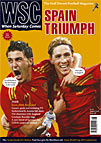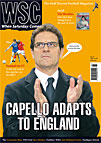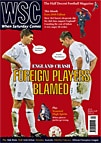What are the expectations for the team?
Expectations remain reasonably low – a respectable group stage with qualification for the quarter-finals. Still, Greece’s amazing run in the qualifying tournament – ten wins out of 12 games, propelling them into eighth place in the FIFA rankings – has made everybody secretly wonder if lightning doesn’t really strike twice.
Are there any players who have appeared in TV commercials or other advertising?
Post-Euro 2004 super stardom opened the ad-money floodgates: Theo Zagorakis advertised bottled water (the aptly named Zagori water), Antonios Nikopolidis went for aluminium fittings, while coach Otto Rehhagel enlightened us on the benefits of eating processed meat products. Striker Angelos Charisteas probably landed the best deal, an orange juice commercial that was funny in a surprisingly self‑deprecating manner.
Is the coach popular?
Are you kidding? Last January Rehhagel was voted most popular man in Greece and that’s three-and-a-half years after he won Euro 2004. King Otto is not just popular, he’s untouchable. The news that he renewed his contract for another couple of years in March was greeted with universal enthusiasm.
Which players are good interviewees and who are the worst?
With 13 controversy-hungry daily sport papers in Athens alone, it’s not surprising that Greek footballers have perfected the art of speaking incessantly without actually saying anything. However, with Panathinaikos’s Ioannis Goumas and Georgios Karagounis, one tends to wonder if that effect is really produced on purpose. Not surprisingly, exiled Greeks are more interesting, albeit in a grumpy sort of way. Benfica’s Kostas Katsouranis has consistently produced the best quotes.
Will there be any rehearsed goal celebrations?
Actually the question is whether there will be any goals to celebrate at all. The Greek team is so defence-oriented that I suspect King Otto has explicitly forbidden any celebration rehearsals lest they give his players ideas. Hopefully, Karagounis will make up with his headless-chicken goal-celebration routine.
Are there any players involved in politics?
With Greek politics tinted, from one end of the spectrum to the other, by aggressive nationalism, it’s just as well that the footballers have so far kept their political views to themselves. Expect the odd “Macedonia is Greek” banner on the terraces, though.
What will be the media coverage be like ?
State TV, who hold the exclusive rights for the tournament, have not yet revealed their plans for Euro 2008, but we have every reason to believe they will, as always, adhere strictly to the Ceausescu school of objective reporting. Irrespective of whether they employ former players as auxiliary propagandists or not, hysterical jingoism will make up for poor journalism.
Will there be many fans travelling to the tournament?
Four years ago in Portugal, the team drew very impressive numbers of travelling fans and the same is expected to happen in Austria. The majority will travel from Greece, though the stupid wig-wearing, toga-clad, face-painted contingent will most probably hail from the diaspora centres of Germany. Ninety per cent of the songs date back to Euro 2004 and they’re so explicit in their celebration of the Greek male’s sexual prowess they will be ignored by TV commentators.
Paul Pomonis
 Scotland's troubles in Macedonia were not just on the pitch, says Kevin Donnelly
Scotland's troubles in Macedonia were not just on the pitch, says Kevin Donnelly

